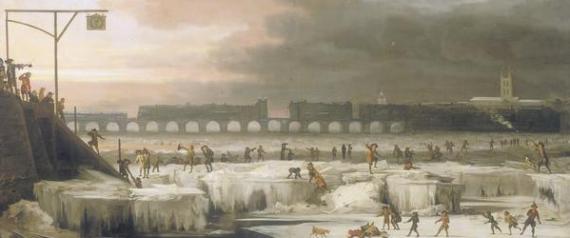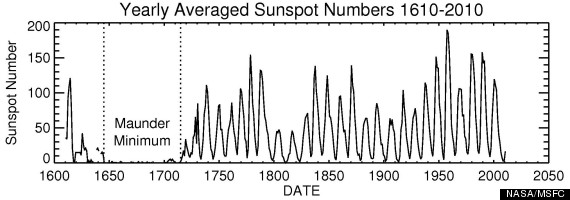Welcome to the Hardcore Husky Forums. Folks who are well-known in Cyberland and not that dumb.
Scientists Debate Whether Solar Lull Could Trigger Another 'Little Ice Age'. Huffington Post
 d2d
Member Posts: 3,109
d2d
Member Posts: 3,109
If it's in the Huffington Puffington Post, even Obama Ball Gargler's like Bill and Honda have to agree with it, don't they?

The Frozen Thames
If you thought the polar vortex was bad, get a load of a new climate phenomenon that just might be coming our way.
Some scientists say we could be headed for another "Little Ice Age," given how eerily calm the sun has been in recent years.
First, a bit of background. The sun goes through cycles that last roughly 11 years, marked by the ebb and flow of sunspots on its surface. At peak sunspot activity, the so-called solar maximum, the sun sports lots of sunspots and is steadily unleashing solar flares and coronal mass ejections (CMEs). Since our current solar cycle, Number 24, kicked off in 2008, the number of sunspots observed has been half of what heliophysicists expected.
Early records of sunspots indicate that the sun went through a period of inactivity in the late 17th Century. Very few sunspots were seen on the Sun from about 1645 to 1715.
While scientists have not proven that low sunspot activity directly caused the "Little Ice Age," and say other factors may have been involved in plunging Europe into the frigid period, they do believe that fewer sunspots may mean less solar energy reached Earth. And this in turn could have led to global cooling.
So if the sun did enter another extended period of low activity, how likely is it we'd enter into our own "Little Ice Age?"
"A new Maunder Minimum will not necessarily affect the Earth in the same way it did during the 17th Century," Giuliana de Toma of the National Center for Atmospheric Research's High Altitude Observatory told HuffPost in an email. "Volcanic eruptions (that have a short-term cooling effect) also played a role in the cold weather observed during the 17th century. Plus we are starting from a warmer Earth."
So maybe not something as dramatic as an Ice Age would happen. But wait a second. If we're trying to combat global warming, could a little cooling action from the sun actually help turn down the heat on Earth?
Maybe, but it wouldn't do much, and not for very long. Researchers at the National Center for Atmospheric Research used a computer model to predict the effect of a future "grand solar minimum" on Earth's climate from 2020 to 2070. The model suggested the minimum might temporarily slow down the warming process by 20-30 percent. But within a few decades afterward, the temperatures would go right back to where they would have been anyway. Sigh.
“I’ve never seen anything quite like this," Dr. Richard Harrison, head of space physics at Rutherford Appleton Laboratory in England, told the BBC. "If you want to go back to see when the sun was this inactive in terms of the minimum we’ve just had and the peak that we have now, you’ve got to go back about 100 years.”
Now, being in a "solar lull" does not mean the sun is completely dormant.
"The sun is most definitely not 'asleep,'" Dr. C. Alex Young, solar astrophysicist and associate science director in the Heliophysics Science Division of NASA's Goddard Space Flight Center, told The Huffington Post in an email. In fact, on January 7th, 2014, NASA observed a massive solar flare burst from a sunspot group measured to be "some seven Earth's across."
But a relatively quiet sun could cause problems. Some scientists say that this period of weak solar activity may mirror what happened before the so-called Maunder Minimum of 1645 to 1715 -- a period named after solar astronomers Annie and E. Walter Maunder, who studied sunspots and helped identify the sun's strange activity in the latter part of the 17th Century. That time period saw only 30 sunspots (one one-thousandth of what would be expected) and coincided with a "Little Ice Age" in Europe, during which the Thames River and the Baltic Sea froze over.
Mike Lockwood, professor of space environment physics at the University of Reading in the U.K., estimated that we have up to a one-in-five chance of being in Maunder Minimum conditions 40 years from now.


The Frozen Thames
If you thought the polar vortex was bad, get a load of a new climate phenomenon that just might be coming our way.
Some scientists say we could be headed for another "Little Ice Age," given how eerily calm the sun has been in recent years.
First, a bit of background. The sun goes through cycles that last roughly 11 years, marked by the ebb and flow of sunspots on its surface. At peak sunspot activity, the so-called solar maximum, the sun sports lots of sunspots and is steadily unleashing solar flares and coronal mass ejections (CMEs). Since our current solar cycle, Number 24, kicked off in 2008, the number of sunspots observed has been half of what heliophysicists expected.
Early records of sunspots indicate that the sun went through a period of inactivity in the late 17th Century. Very few sunspots were seen on the Sun from about 1645 to 1715.
While scientists have not proven that low sunspot activity directly caused the "Little Ice Age," and say other factors may have been involved in plunging Europe into the frigid period, they do believe that fewer sunspots may mean less solar energy reached Earth. And this in turn could have led to global cooling.
So if the sun did enter another extended period of low activity, how likely is it we'd enter into our own "Little Ice Age?"
"A new Maunder Minimum will not necessarily affect the Earth in the same way it did during the 17th Century," Giuliana de Toma of the National Center for Atmospheric Research's High Altitude Observatory told HuffPost in an email. "Volcanic eruptions (that have a short-term cooling effect) also played a role in the cold weather observed during the 17th century. Plus we are starting from a warmer Earth."
So maybe not something as dramatic as an Ice Age would happen. But wait a second. If we're trying to combat global warming, could a little cooling action from the sun actually help turn down the heat on Earth?
Maybe, but it wouldn't do much, and not for very long. Researchers at the National Center for Atmospheric Research used a computer model to predict the effect of a future "grand solar minimum" on Earth's climate from 2020 to 2070. The model suggested the minimum might temporarily slow down the warming process by 20-30 percent. But within a few decades afterward, the temperatures would go right back to where they would have been anyway. Sigh.
“I’ve never seen anything quite like this," Dr. Richard Harrison, head of space physics at Rutherford Appleton Laboratory in England, told the BBC. "If you want to go back to see when the sun was this inactive in terms of the minimum we’ve just had and the peak that we have now, you’ve got to go back about 100 years.”
Now, being in a "solar lull" does not mean the sun is completely dormant.
"The sun is most definitely not 'asleep,'" Dr. C. Alex Young, solar astrophysicist and associate science director in the Heliophysics Science Division of NASA's Goddard Space Flight Center, told The Huffington Post in an email. In fact, on January 7th, 2014, NASA observed a massive solar flare burst from a sunspot group measured to be "some seven Earth's across."
But a relatively quiet sun could cause problems. Some scientists say that this period of weak solar activity may mirror what happened before the so-called Maunder Minimum of 1645 to 1715 -- a period named after solar astronomers Annie and E. Walter Maunder, who studied sunspots and helped identify the sun's strange activity in the latter part of the 17th Century. That time period saw only 30 sunspots (one one-thousandth of what would be expected) and coincided with a "Little Ice Age" in Europe, during which the Thames River and the Baltic Sea froze over.
Mike Lockwood, professor of space environment physics at the University of Reading in the U.K., estimated that we have up to a one-in-five chance of being in Maunder Minimum conditions 40 years from now.


Comments
"So maybe not something as dramatic as an Ice Age would happen. But wait a second. If we're trying to combat global warming, could a little cooling action from the sun actually help turn down the heat on Earth?
Maybe, but it wouldn't do much, and not for very long. Researchers at the National Center for Atmospheric Research used a computer model to predict the effect of a future "grand solar minimum" on Earth's climate from 2020 to 2070. The model suggested the minimum might temporarily slow down the warming process by 20-30 percent. But within a few decades afterward, the temperatures would go right back to where they would have been anyway. Sigh. "
Kill yourself